News & Events in Belarus
Quality, affordable housing. How Lukashenko has resolved the housing shortage problem in Belarus
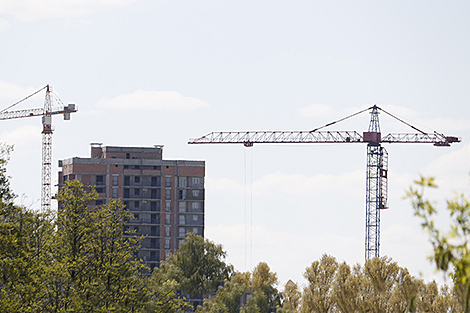
An archive photo
Once upon a time Khrushchev houses helped the large country solve the acute problem of housing shortage. On average, it took 12 days to build a house. It was rumored that one brigade from Leningrad managed to do it in five days. Soviet people were not accustomed to luxury, so they were content with modest apartments. In the new episode of BelTA’s YouTube project After the Fact: Lukashenko’s Decisions, we will tell you how housing preferences of Belarusians have changed, how much housing is being built in our country now, and what modern neighborhoods should not look like according to the president.
How was the operation of Belarus’ construction industry streamlined?
After the collapse of the Soviet Union, it suddenly became clear that there was nothing to build because there was nothing to build with. Neither normal building materials nor machines and vehicles were available. In 1995 the rate of housing commissioning dropped as much as 4 times. The president decided to provide Belarusians with affordable and comfortable housing despite all the difficulties. A legal base and financial tools were needed to accomplish this goal.
“Housing construction plays a big role in the growth of our economy. Unlike most post-Soviet countries, Belarus has not allowed the civil engineering industry to collapse and has established a system of state support for housing construction. The republic allocates significant financial resources for this purpose annually, including through the allocation of soft loans,” Belarus President Aleksandr Lukashenko told the Belarusian People’s Congress in March 2006.
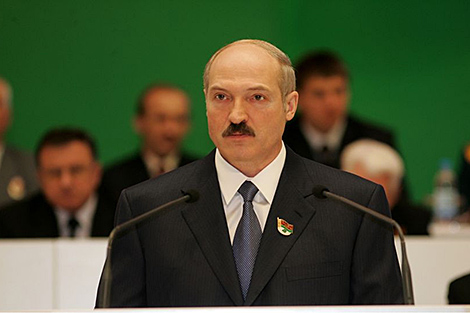
The light at the end of the tunnel appeared in 1996. Regulatory acts on preferential lending for housing construction began to change. Families began to receive financial assistance with the repayment of loans when they gave birth to children. A massive effort was launched to renew the civil engineering industry. It was impossible to increase the volume of housing construction without retooling the industry.
“By the end of 2000 we reached the performance indicators, which had been registered prior to 1990.The head of state made decisions on modernization of existing plants in Krichev and Krasnoselsky. The plants were modernized and switched to the dry cement making process. Later on the holding company Belarusian Cement Company was established to unite three cement mills. It was a difficult time due to sharp spikes of currency exchange rates. Belarus president decree No.181 [on cement industry organizations] ensured normal operation and development of the plants,” Belarusian First Deputy Architecture and Construction Minister Oleg Shvets said.
How much housing is built in Belarus?
Today Belarus’ civil engineering industry includes over 8,000 organizations. Almost 254,000 workers are employed in the sector. The physical infrastructure of the enterprises is being improved. Advanced technologies and materials are being developed. The government does everything to allow as many Belarusians as possible to move into their own homes. There are plans to commission 4.3 million m2 of housing this year. As much as 1.758 million m2 was already built in H1 2023. As well as 4,110 apartments for large families. 171 apartments for social uses. 64 for the resettlement of citizens living in dilapidated and unsafe houses. 750 in satellite towns.
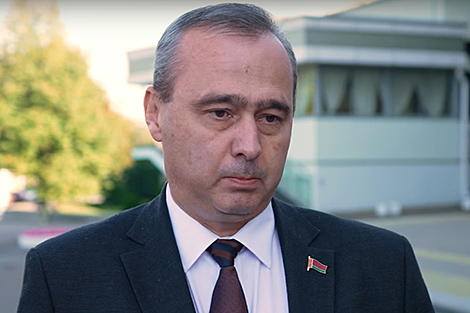
“There is a housing program that provides for a gradual increase in housing construction. This year’s target is 4.3 million m2. We project we will hit this year’s target. Apart from that, the focus has been shifted to the development of satellite towns. Approximately 300,000m2 of housing was commissioned in 2020-2022. This year we plan to commission 102,000m2 of housing in satellite towns,” Oleg Shvets noted.
What has changed in the beautification of territories around residential houses?
A home is more than just a roof over your head. It is a place where you want to return to and spend time. It is understandable that approaches to living space change over time. 30 years ago no one was embarrassed by apartments with small kitchens and combined bathrooms. Today such a layout raises a few eyebrows, to put it mildly. People want comfort not only inside, but also outside. They want safe playgrounds, parking lots, and well-developed infrastructure within walking distance. The head of state also demands that new construction areas must not be turned into stone jungles.
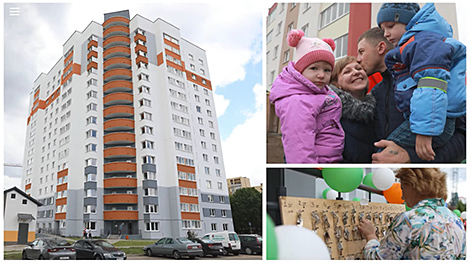
“The territory around houses is beautified as little as possible. At best people get a children’s playground. It is not clear what kind of a playground. A couple of trees. Or they can get nothing but asphalt and tiles. How can a person live in such a stone jungle? It’s shameful to look at the new neighborhoods,” Aleksandr Lukashenko drew attention to shortcomings in the development of adjacent territories during a republican seminar-conference on improving the performance of Belarus’ civil engineering industry in November 2018.
“Severe restrictions of the past are no longer around. Today we only regulate the minimal ceiling height. And all other standards for housing do not specify the composition of the apartment. Those are determined at the design stage. In addition, the Architecture and Construction Ministry insists on reusing the same designs over and over because people on the housing register need optimal housing at minimal cost. This housing needs to be designed and built as fast as possible,” Oleg Shvets noted.
What Belarusians can count on state support for housing construction?
The state will help people in need of housing to acquire housing. Large families with many children and military personnel can count on support in the first place. This has been mentioned more than once by the president. Parents should not refuse to give birth to a child only because the living space is cramped. Demographic security is a priority of the government policy. Do we need to talk about supporting those who stand guard over our peace and tranquility every day?
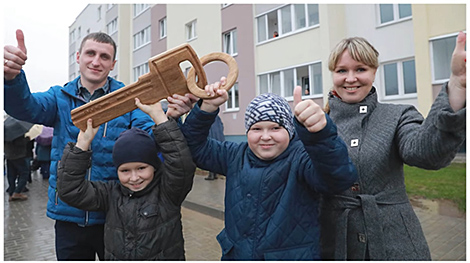
“The principle is simple. Everyone should have the ability to improve housing conditions. But preferential housing equals free housing in many cases, you understand. Only those who need it badly will get housing. Large families… Do you want a free apartment? You need three, four, five kids. Give birth and contact us. One, two children? You have to use your own resources to get housing. People, whose income is limited due to objective reasons. We’ll help them. And those who bear a higher responsibility to society, let’s say, people in uniform. They are placed under arms today and they know: if things go south, he will not think about his family or himself. If he’s dead, he’s dead. That’s our fate, the fate of men. But we must provide for them today. So that they wouldn’t have to think where their children and family will stay when they go on duty,” Aleksandr Lukashenko outlined important directions of housing construction in his address to the nation and the parliament in May 2012.
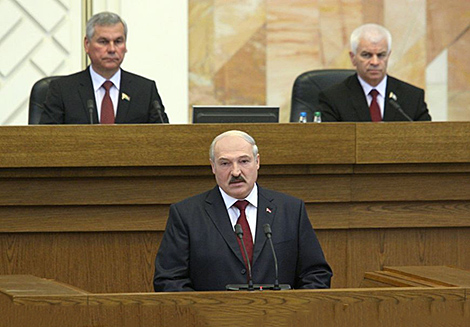
The head of state’s opinion about the matter has not changed ten years later. “It is an outrage when a soldier dedicates himself to the country and doesn’t know what will happen to him tomorrow. He wanders all over the city or the country looking for some place to live,” Aleksandr Lukashenko stated at a conference on providing military personnel and equal-status persons with housing in December 2022. “The serviceman must be assured that he will be provided with housing after his service is over.”
The head of state also emphasized it when he talked to employees of the Belarusian National Biotechnology Corporation in November 2022. “We are now working out social programs, especially on housing. Large families are a priority. Within a year or two at the most, we will definitely provide large families with housing. Because this is the most important thing, it is more important than the Belarusian National Biotechnology Corporation. This is demographic security. This is the independence of our country if we have children… We need to recover and ensure population growth. Therefore, in the near future we will review all benefits and will transfer them to large families, to the military wherever possible. You know, to those, who can’t do business. And the rental housing that your company builds. We will support it to provide housing for the working class,” the president said.
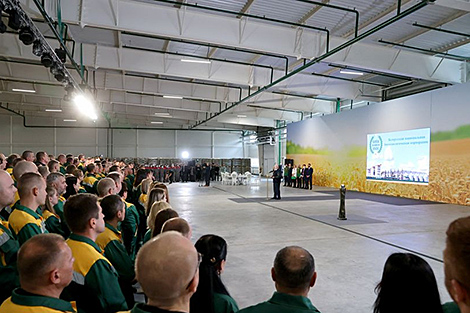
Why did Belarus start developing the construction of rental housing?
The implementation of the president’s decision to build rental housing began in 2012. More than 10,000m2 of such housing was commissioned back then. Rental housing is intended for those who cannot build or buy housing, for those who are not eligible for state support. The rent is lower than the market level. It means that a family with an average income can afford the rent. And this type of housing has become widespread. The demand for rental housing exceeds the supply, and not only because of the affordable price. If you rent a private home, the landlord can kick you out at any time, but the state offers stable guarantees.
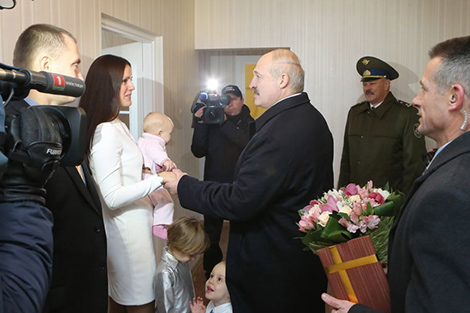
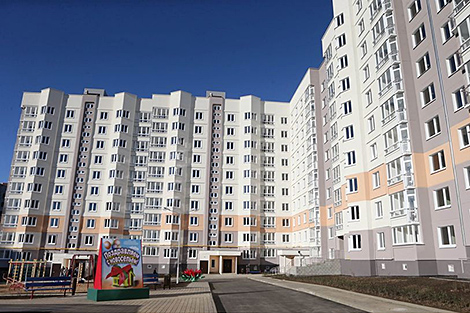
“The state should not be the only one to care about rental housing. Everyone needs to pitch in and every enterprise needs to be assigned a performance goal. Certainly, the state will build most [of the rental housing] but enterprises should invest in it as well. If you are an executive, you have to think about prospects of the enterprise, primarily prospects of your workforce,” Aleksandr Lukashenko encouraged the management of enterprises to build rental housing as he visited the housing estate Mikhalovo-2 in Minsk in October 2014.
“In many countries more than 80% of housing is rental housing. We have a slightly different psychology. Nevertheless, the construction of rental housing is gradually picking up the pace in Belarus. We commissioned 113,000m2 in 2019. This year we plan to commission 300,000m2 of rental housing,” Oleg Shvets noted.
On what terms can Belarusians get housing construction loans?
Housing has to be affordable. The president formulated the goal at the dawn of the formation of independent Belarus. This approach is still relevant now. The program meant to guide Belarus’ social and economic development until 2025 provides for a number of directions for further improvement of the quality of life of Belarusians. This includes the growth of housing construction for large families, construction of rental housing, and green construction. Belarusians, who are on the housing register and are eligible for state support, can take loans. Banks also have a number of partnership programs with real estate developers.
“The main problem today is not only the construction of apartments, but also their affordability. We are working purposefully to solve this problem. In 2001 a monthly salary could buy only 0.3m2 of housing. In 2005 a monthly salary could buy almost 0.7m2. But in the rest of the world you can buy 1m2 for an average monthly salary. We need to achieve this high world level of development in housing construction within this five-year period. And if a family can buy 1m2 of housing for a monthly salary, the family is considered solvent in the world and can take a soft loan for the construction and purchase of a new apartment or a house,” the head of state told the Belarusian People’s Congress in 2006 and called for making housing more affordable for Belarusians.
In his address to the nation and the parliament in August 2020 the Belarusian leader mentioned good performance of the civil engineering industry: “The civil engineering industry demonstrates rather good performance. It was one of the few economy branches that managed to expand during the pandemic and pull up the entire GDP. It demonstrated an increase of 5.5% in the first half of the year. The construction of housing with state support increased by 17%. It is necessary to develop this area and to finance it more actively.”
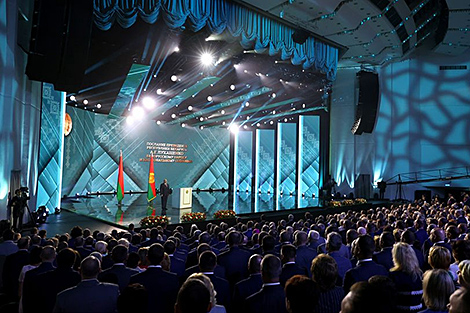
“There are two loan options for those in need of better housing. They are stipulated by decree No.13 and decree No.240. Decree No.13 provides for standard loans for up to 20 years. This period is extended to 40 years for orphans and large families. At the same time, the lending rate of 1-5% is determined annually. Under decree No.240 the loan term is 20 years. The current interest rate is 12.5% per annum,” Oleg Shvets noted.
Where are services and competences of Belarusian construction companies in demand?
Construction is also an export-oriented business. Belarusians actively build residential houses and social infrastructure abroad. Thanks to integration within the Union State of Belarus and Russia, our construction companies work throughout Russia without obstacles. We can easily build a house. Of course, not within five days as Leningrad brigades managed to do back in the day, but we can build quality housing. Belarusians were offered to participate in big construction projects at the cosmodrome for a reason, but that is another story.
“We must create all conditions and mechanisms to help primarily people in need of better housing. And this direction is the most important component of the social policy in Belarus. It will remain forever, I think,” Aleksandr Lukashenko said during a conference on the new draft of the Housing Code and on improving the legislation on reducing the number of vacant and dilapidated houses in October 2017.



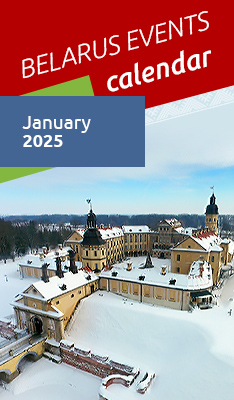




 print version
print version make home page
make home page add to bookmarks
add to bookmarks

